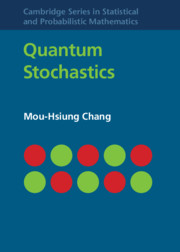Book contents
- Frontmatter
- Dedication
- Contents
- Preface
- Introduction and Summary
- 1 Operator Algebras and Topologies
- 2 Quantum Probability
- 3 Quantum Stochastic Calculus
- 4 Quantum Stochastic Differential Equations
- 5 Quantum Markov Semigroups
- 6 Minimal QDS
- 7 Quantum Markov Processes
- 8 Strong Quantum Markov Processes
- 9 Invariant Normal States
- 10 Recurrence and Transience
- 11 Ergodic Theory
- Bibliography
- Index
7 - Quantum Markov Processes
Published online by Cambridge University Press: 05 February 2015
- Frontmatter
- Dedication
- Contents
- Preface
- Introduction and Summary
- 1 Operator Algebras and Topologies
- 2 Quantum Probability
- 3 Quantum Stochastic Calculus
- 4 Quantum Stochastic Differential Equations
- 5 Quantum Markov Semigroups
- 6 Minimal QDS
- 7 Quantum Markov Processes
- 8 Strong Quantum Markov Processes
- 9 Invariant Normal States
- 10 Recurrence and Transience
- 11 Ergodic Theory
- Bibliography
- Index
Summary
As mentioned previously, a classical Markov semigroup of transition operators {Tt, t ≥ 0} can be generated from a classical Markov process {Xt, t ≥ 0}. On the other hand, given a Markov semigroup, a Markov process {Xt, t ≥ 0} can be constructed based on the Markov semigroup {Tt, t ≥ 0} using the Kolmogorov consistency theorem. In the context of quantum probability space (A, ρ), a Markov dilation (i.e., construction of a quantum Markov process from a given quantum Markov semigroup of operators {It, t ≥ 0}) turns out to be a nontrivial matter. This is partly due to the fact that, although the general concept of conditional expectation of an observable given a sub-von Neumann algebras B ⊂ A can be defined and required properties can be described, an explicit construction of such a conditional expectation is still unavailable in general. The main objective of this chapter is to introduce relevant concepts and to develop some properties of quantum Markov processes in the content of quantum probability explored in previous chapters.
There are 2 major components in this chapter: (i) introduction of concepts and derivation of properties of a quantum Markov processes based on some assumed and/or derived properties of conditional expectation Eρ[· |At]] given a filtration of sub-von Neumann algebras {At], t ≥ 0} of A, and (ii) Markov dilation or construction of a weak quantum Markov flow (WQMF) from a given quantum Markov semigroup {It, t ≥ 0} using the weak conditional expectation E[· | Ft], where {Ft, t ≥ 0} is a filtration of orthogonal projection operators defined on the complex Hilbert space ℍ.
The main objective of the first component is to introduce the relevant concept and develop some properties of quantum Markov processes in the content of quantum probability explored in previous chapters. Although the theory of (classical) Markov processes is well known in the probability community (see, for example, Dynkin [Dyn62], Ethier and Kurtz [EK85]), we outline some basic concept and results from the classical theory of homogeneous Markov processes below for comparison purpose.
- Type
- Chapter
- Information
- Quantum Stochastics , pp. 224 - 261Publisher: Cambridge University PressPrint publication year: 2015



